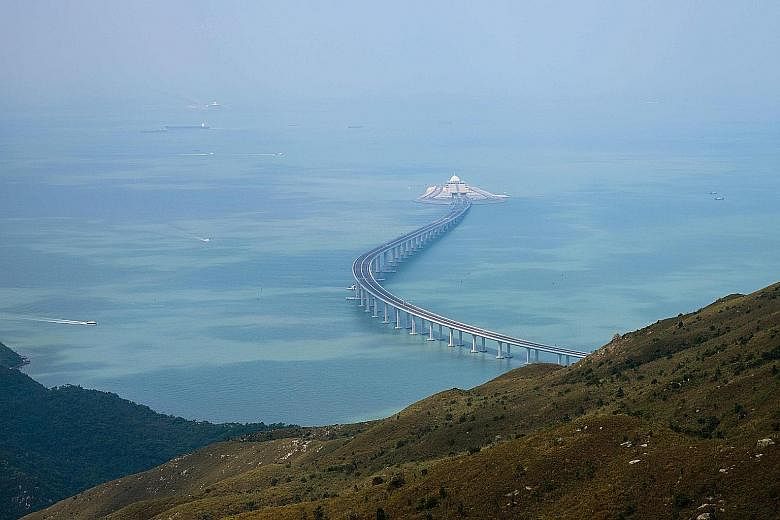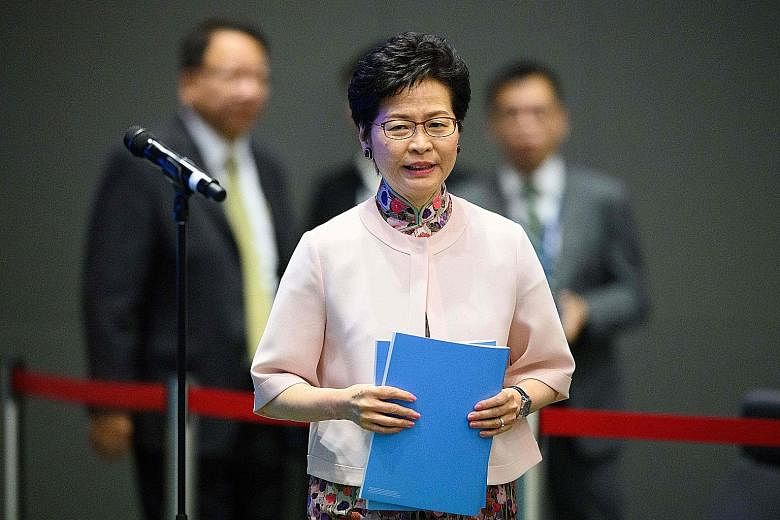Hong Kong leader Carrie Lam has unveiled a divisive land reclamation proposal to build houses, infrastructure and transport networks on artificial islands around Lantau - the city's largest outlying island - to turn it into a double gateway to the world and the Greater Bay Area as part of a longer-term development strategy.
Chief Executive (CE) Lam yesterday delivered her pledge to drastically ramp up land supply with the "Lantau Tomorrow Vision", billed as the blueprint for land development in a city plagued by sky-high property prices and a housing shortage.
The islands - situated near Kau Yi Chau and Hei Ling Chau in the central waters, as well as the coastal areas of Tuen Mun - will have a total area of about 1,700ha and provide up to 400,000 residential units for up to 1.1 million people. Of these, 70 per cent of the units will be for public housing.
The development is expected to create some 340,000 jobs over the next 20 to 30 years.
"Improvement of livelihood and development of the economy and transport infrastructure ... hinge on land resources, without which all strategies or plans will end up in empty talk," Mrs Lam said.
She wrote in her full policy address that the construction of artificial islands in the central waters will lead to the third core business district after Central and Kowloon East.
A dedicated office reporting to Mrs Lam will be set up as soon as possible to oversee the ambitious project.
Reclamation works are to start in 2025, with the first batch of flats to be available in 2032.
To free up more land for housing, studies on redevelopment of brownfield (or previously built-upon) sites in the New Territories will be quickened, while industrial buildings will be converted to provide transitional housing for those waiting for public housing.
Mrs Lam also pledged to raise the ratio of public to private flats in new developments to 70:30, from 60:40.
-
KEY POINTS
-
HOUSING
• 70 per cent of units on the government's newly developed land will be for public housing.
• Land reclamation to create artificial islands totalling 1,700ha around Lantau.
• Develop brownfield sites in New Territories, convert industrial buildings to provide transitional housing, and introduce land-sharing pilot scheme to maximise privately owned land.
INNOVATION & TECHNOLOGY
• Another HK$28 billion (S$5 billion) on top of an earlier earmarked HK$50 billion to boost university research, re-industrialisation and application of technology in public services.
TRANSPORTATION & LOGISTICS
• Tax measures to drive ship leasing business, tax reliefs to promote marine insurance and underwriting of speciality risks, and an injection of HK$200 million into the Maritime and Aviation Training Fund to groom talent.
LABOUR
• To ease the burden of employers after scrapping an off-setting mechanism under the Mandatory Provident Fund Scheme, the government will offer HK$29.3 billion in subsidies for employers over 25 years. This is more than the HK$17.2 billion over 12 years previously announced.
EDUCATION
• An additional HK$4.7 billion to improve quality of education by providing schools with a recurrent Life-wide Learning Grant. The government will also roll out the all-graduate teaching force policy in primary and secondary public schools, and strengthen administrative support, among other things.
WELFARE AND HEALTHCARE
• Longer maternity leave, from 10 to 14 weeks. The additional four weeks of paid maternity leave will be borne by the government in full for staff with a monthly income of HK$50,000 and below.
• Import, manufacture, sale, distribution and advertisement of e-cigarettes and other new smoking products will be banned.
CREATIVE INDUSTRIES
• One-off HK$1 billion injection into the Film Development Fund to boost the local film industry.
-
Claire Huang
In her second annual policy address, the leader said a land-sharing pilot scheme aimed at utilising privately owned plots not covered by the government's planned development will be introduced as early as next year.
To seek support for the controversial proposal, Mrs Lam began her 40-minute speech in the Legislative Council by pointing out that it is "difficult to forge an absolute consensus in the community" but cautioned that "divergence of views should not become an obstacle" to Hong Kong's progress nor bring it to a standstill.
But the proposal has come under fire by pro-democracy parties that said it could cost as much as HK$1 trillion (S$176.4 billion).
Said Mr Jeremy Tam of the Civic Party: "It is going to spend money that belongs to several of our next generations... I don't see how it can solve our issues."
While pro-Beijing lawmaker and New People's Party chair Regina Ip agreed with the Lantau plan in principle, she wanted details on cost.
Meanwhile, pro-democracy lawmakers from the Council Front alliance said Mrs Lam has failed to explain why more land needs to be reclaimed. The government had earlier proposed to reclaim 1,000ha.
Conservation group WWF Hong Kong said in a tweet that it "is disappointed in the CE's policy blueprint to push ahead with Hong Kong's largest reclamation project, which will result in the permanent loss of marine habitat".
Housing aside, Hong Kong will also be stepping up efforts to drive innovation and technology through an additional HK$28 billion allocated for university research, re-industrialisation and the application of technology in public services, among other things. This is on top of the HK$50 billion earmarked in this year's budget.
Besides outlining her priorities in healthcare, eldercare and education, Mrs Lam yesterday also confirmed earlier media reports that the government will offer a massive increase in subsidies for local businesses.
This is to get their support to scrap a controversial arrangement where employers can dip into pension and severance payments for employees.




